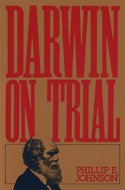Darwin on Trial
Significance of Darwin on Trial
by Joshua Youngkin
Phillip E. Johnson’s Darwin on Trial may be rightly hailed as the revolutionary work of a revolutionary soul, and a standard in American protest literature. Originally published in 1991, the book has sold more than 250,000 copies and has been translated into French, Polish, Chinese, and Korean. Although Johnson wrote for the benefit of a lay readership, his arguments proved captivating for many young scientists and other scholars who gathered around Johnson and developed the theory of intelligent design.
As its title suggests, Johnson’s book takes on the scientific theory inspired by Charles Darwin. In his classic 1859 work On the Origin of Species, Darwin proposed that the various forms of life we see in nature are the result of a blind and unguided process of natural selection acting on random variations. In the decades that followed, Darwin’s ideas merged with insights from the burgeoning field of genetics into a powerful synthesis known as neo-Darwinism. Naturalist at its inception and universal in its aims, neo-Darwinism spread quickly from evolutionary biology to the rest of the life sciences. Not content to rule that kingdom only, naturalists seized on this early success to gradually export some form of neo-Darwinism or another from the life sciences to virtually all the knowledge-making and problem-solving disciplines, even law. There, Darwin-as-philosophy inspired sociological jurisprudence and legal realism before mixing in the late 20th century with dissident politics and continental critical theory to form the intellectual foundation of the Critical Legal Studies (CLS) movement, a loosely affiliated cadre of legal scholars who would characteristically step back from rules-as-givens to instead interrogate the sources and uses of law as held in the hands of the presently powerful. Deep into CLS writings dove Phillip E. Johnson, a law professor who realized from his examination of CLS that the tools of critical theory and social constructionism had been used to destabilize everything except that which first gave them life: neo-Darwinism.
Against the almost religiously-motivated attempts to universalize neo-Darwinism, Johnson published Darwin on Trial, a direct challenge not only to the orthodox interpretation of the various lines of evidence for the paradigm, but also to naturalism, the larger framework and rule-set within which objects of discourse are seen and declared by disciplinary leaders as evidence (or not) in the first place. Over the course of 213 pages, Johnson systematically deconstructs the key arguments proffered in favor of the causal efficacy of natural selection and random mutation (to the exclusion of agency) while subjecting the underlying naturalist philosophy to similarly withering critique. By book’s end, the careful reader would rightfully doubt that that the Darwinian scientist or popularizer is any more objective, neutral and detached than the lawyer, teacher, or carpenter—each worker trained just like the other to see and do as he was trained, none specially enabled to stand outside his frame of reference to see the world as it really is, unmediated and plain.
Darwin on Trial revealed that the neo-Darwinists were bluffing all along, that the inroads neo-Darwinists made into the world outside the narrow confines of evolutionary biology were ill-gotten gains, and that these were thus subject to challenge if not reversal. Even so, who could challenge the entrenched dominance of neo-Darwinism within the life science community? Johnson showed laymen and upstart scholars outside the paradigm how to maintain an intellectually satisfying skepticism toward neo-Darwinism, true, but establishment scientists and other academics were largely unmoved, for within that neo-Darwinian paradigm they live and move and have their being, knowingly or not. That is, even though natural causes don’t seem to do all that naturalists ask of them, for the scientific inquirer non-natural causes like designing agency are ruled out of bounds from the start, so nature and her deterministic ways must be causally sufficient to explain all phenomena, Johnson’s critique notwithstanding.
Darwin on Trial anticipated such boxed-in thinking and provided an antidote for it. Johnson readily acknowledged that from the “inside” of a paradigm, it is hard to imagine how things could be seen or done differently. Yet this does not mean that the paradigm itself cannot—or should not—be questioned. In the case of neo-Darwinism, the naturalists’ rule that only physical objects are ultimately real and only reductionist and quantitative methods can be used to capture and express this reality is neither self-evident nor inevitable. Rather, it is an always-contestable, man-made rule used by naturalists to serve all-too-human purposes, as Darwin on Trial suggests.
For those just beginning to suspect themselves confined by scientific naturalism, Darwin on Trial offers a way out. Few other works have been designed to offer a genuinely liberating perspective, fewer still actually provide it, and only a handful have ever launched a movement just for that purpose. Of these, Johnson’s book goes right to the root of what man is and where he comes from, the most pressing and significant question we ask ourselves, as naturalists and design theorists both know. For its critical approach to the most critical matter, Darwin on Trial is in a class by itself.
Praise for
Darwin on Trial

Darwin on Trial shows just how Darwinian evolution has become an idol of the contemporary tribe, and how deeply philosophical and religious ideas enter into its status as part of the intellectual orthodoxy of our day.
Alvin Plantinga, Notre Dame University
Calm, comprehensive, and compellingly persuasive.
Richard John Neuhaus, Editor, First Things
Darwin on Trial is unquestionably the best critique of Darwinism I have ever read. Prof. Johnson combines a broad knowledge of biology with the incisive logic of a leading legal scholar to deliver a brilliant and devastating attack on the whole edifice of Darwinian belief. There is no doubt that this book will prove a severe embarrassment to the Darwinian establishment.
Michael Denton, medical geneticist and author of Evolution: A Theory in Crisis
In his own era, Darwin’s most formidable opponents were fossil experts, not clergymen. Even today, according to the author, the fossil record, far from conclusive, does not support the presumed existence of intermediate links between species. A law teacher at UC-Berkeley, Johnson deems unpersuasive the alleged proofs for Darwin’s assertion that natural selection can produce new species. He also argues that recent molecular studies of DNA fail to confirm the existence of common ancestors for different species. Doubting the smooth line of transitional steps between apes and humans sketched by neo-Darwinists, he cites evidence for ‘rapid branching,’ i.e., mysterious leaps which presumably produced the human mind and spirit from animal materials. This evidence, to Johnson, suggests that ‘the putative hominid species’ may not have contained our ancestors after all. This cogent, succinct inquiry cuts like a knife through neo-Darwinist assumptions.
Publishers Weekly
Dissecting the writings of Gould, Futuyama, Darwin, and Dawkins with a trenchant sword, law professor Johnson uses an attorney’s reasoning to scrutinize the scientists’ logic in defining the theory of evolution,
Library Journal.
Very impressive in its examination of scientific evidence on its own terms. It is careful, scrupulously fair, and consistent in its application of the rules (and the spirit of the rules) of evidence. Johnson argues that naturalist evolution is not based on a fair assessment of the scientific evidence. He concludes that evolution is not only unproven, but contrary to the overwhelming weight of scientific evidence. Evolution is another kind of fundamentalism. This is a very well written book. Professor Johnson’s approach is calm, but his arguments have a quiet urgency that prove to be compelling to the intelligent reader. His case is invigorating and persuasive.
The Appellate Practice Journal and Update
This Berkeley law professor’s takedown of scientific naturalism launched Intelligent Design and gained creationists a level of public attention they hadn’t enjoyed since the Scopes trial.
Christianity Today
[W]hat is indisputable at this point is that Darwin on Trial and the events leading up to its publication were crucial in the transformation of a loose collection of scholars and their ideas into a nascent movement based upon antimaterialistic and design notions. Johnson provided that movement not only with a manifesto and a strategy but also with a powerful voice. Movements, however, do not emerge out of thin air, and rarely are they simply the product of one person’s vision; they emerge out of an historical context. For intelligent design, that context was the growing awareness in the 1980s that continuing the origins debate in American intellectual culture from the stance of biblical authority was unlikely to be effectual. Johnson arrived on the scene with an argument, strategy, and temperament well suited to mold these impulses into a movement that captured considerable attention in the origins debate of the mid- to late-1990s. More than any one person Phillip Johnson shaped the course of the origins debate in the 1990s.
Donald Y. Yerxa, Professor of History, Eastern Nazarene College
Reviews of Darwin on Trial
Critical Review by William Hasker
Critical Review by Eugenie C Scott and Thomas C Sager
Critical Review by Wesley Elsberry
Critical Review by Stephen Jay Gould
Critical Review by Nancey Murphy
Johnson’s Reply to Gould at ARN, also here at PCSF
Arnold Claasen’s Brief Reply to Murphy
Johnson replies to Murphy in Reason in the Balance.
Positive Review by Stephen Meyer
Positive Review by Thomas Woodward
Positive Review by Raymond Bohlin
Positive Review by Cathy Duffy
Positive Review by Doug Peck
